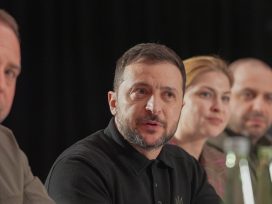
The ‘Trump–Putin deal’ again places Ukrainians in a subaltern role. The leaked contract with its fantasy $500 billion ‘payback’ has been compared to Versailles, but the US betrayal recalls nothing so much as Molotov–Ribbentrop.
Four NGOs in Kharkiv explain what the suspension of USAID funding means for their work. They include a media organization countering Russian propaganda, a centre providing veterans with legal advice, and volunteer groups refurbishing war-damaged buildings.
On 24 January it was announced that the United States Agency for International Development, or USAID, would be suspending funding for all its programmes and projects. This followed a US State Department directive on 20 January ordering a 90-day pause in USAID for the purpose of ‘assessment of programmatic efficiencies and consistency with United States foreign policy’.
Voluntary sector organisations and local government bodies in Ukraine working in economic development, humanitarian aid, democracy promotion and human rights who had been receiving USAID funding found themselves in various situations. Some were able to continue working, because the USAID funds were not their primary source of revenue. But others have had to put projects on hold and search for ways to survive.
Gwara Media talked to four organisations based in the Kharkiv region that have lost US funding and are now compelled to adapt to the new conditions.
‘Especially for local or hyperlocal media, the suspension of USAID funding will cause an information desert,’ says Olena Leptuha, head of the Kharkiv Crisis Infocentre and editor-in-chief of the Nakypilo media group. ‘This void has been filled over the years thanks to the dedicated work of media professionals and the support of foreign funds. I see a huge threat here, because the enemy is unlikely to reduce the informational pressure and we may lose the high-quality media outlets that have resisted it.’
The Infocentre emerged in 2014 as a response to the outbreak of the war in Ukraine and has been operating as a multi-platform organisation ever since. It consists of a platform for press conferences, briefings and cultural events, as well as an editorial office that produces news and multimedia. After organisational changes in 2022, the radio station ‘Nakypilo’ became a separate organisation. It broadcasts on FM frequencies that operate in the Kharkiv Oblast and its signal now reaches as far as Belgorod in Russia. An educational organisation, ‘Nakypilo Education,’ which conducted media literacy training has also emerged.
‘In 2014–2015, USAID supported the newspaper Forum, which we published for a year,’ says Olena Leptuha. ‘It was distributed free of charge in Kharkiv and the oblast. The paper included analyses of reforms, analytical and explanatory materials, and photo reports. We also made QR codes that linked to our videos. Basically, we provided information that was difficult to obtain in some districts. Later, USAID also supported the radio. But we did not have institutional support.’
The withdrawal of USAID funding for the National Endowment for Democracy (NED) has also had knock-on effects for the Kharkiv Crisis centre. The suspension of NED funding for Internews has meant that the Kharkiv Crisis centre has been unable to carry out an Internews-supported project to create materials to counteract Russian disinformation. The Infocentre has been told that projects supposed to have been implemented by June 2026 have also been suspended. This affects the work of radio Nakypilo, since the funds would also have covered office rental and basic salaries.
Only a small fraction of USAID funds was directed to media development, according to Leptuha. Infrastructure projects were a higher priority. When journalists from Nakypilo filmed the consequences of a Russian missile strike on Izium, they saw how equipment emblazoned with huge USAID logos arrived at the location. USAID was concerned with broader processes in Ukraine. In Izium, for example, 80% of the infrastructure has been destroyed. ‘It definitely needs foreign investment,’ says Leptuha.
‘As for media organisations, this is a blow to freedom of speech,’ she noted. ‘People exhausted by the war will receive less information and it will be easier to manipulate them. In the context of elections, this issue becomes even more acute. If only those who are financed by politicians or exclusively pro-government media remain, then it will be a step back to the time before independent media appeared in Kharkiv, working to strengthen civil society.’
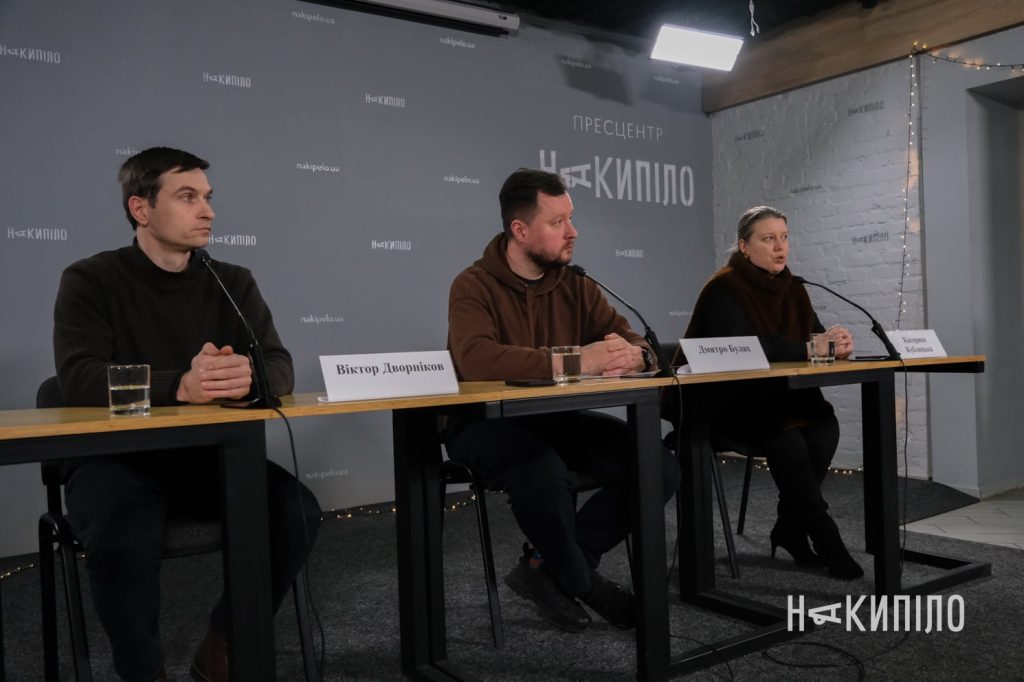
Event at the Nakypilo press center. Photo: Nakypilo / Source: Gwara Media
The Chuhuiv Human Rights Group (CHRG) has been operating since 2011. It focuses on providing legal assistance and undertaking educational activities on upholding human rights. It also runs a veterans’ centre, where its employees work with military personnel and their families free of charge.
This is not the first time the organisation has found itself without funding, says Roman Likhachov, the head of the CHRG. On previous occasions it was supported by contributions from its team members. When USAID suspended its funding, one of the Group’s projects had just been completed.
‘Funded projects generally permit the organisation to expand its activities,’ Likhachov observes. ‘However, if an organisation cannot otherwise undertake any activities, then the issue is with the organisation itself. In our opinion, the organisation must ensure its sustainable development in a way that these projects make it possible to expand or reduce its activities. It should not be the case that if there is a financed project, then the organisation functions, but if there is no such project, then the organisation does not operate.’
For example, the CHRG provides free legal assistance and information to veterans’ organisations, veterans, and displaced persons. Even after the USAID funding was terminated, the situation for the CHRG did not change significantly. Its representatives continued their activities, albeit on a smaller scale. According to Likhachov, specialists previously paid via USAID now work voluntarily.
Funds were also used to pay court costs, which, according to Likhachov, not everyone can afford. The CHRG plans to continue helping this target group, in addition to searching for resources. In parallel with these areas, CHPG is drafting new projects and coordinating its work with various organisations.
According to Likhachov, there is currently a distorted understanding in Ukraine of how funding works. People often think that funds are used to pay volunteer workers. While the development of the voluntary sector was indeed one of the goals of USAID, most of the funds were received by the state and local government.
Likhachov remarks that funding partners occasionally cover the costs that the state should be providing. ‘We work a lot with veterans and military personnel,’ he says, ‘and I see a substantial demand for legal aid which the state does not cover with free legal aid centres. If USAID and other organisations do not help the state, then local self-government organs will have to take responsibility for solving this problem, because it is not going anywhere.’
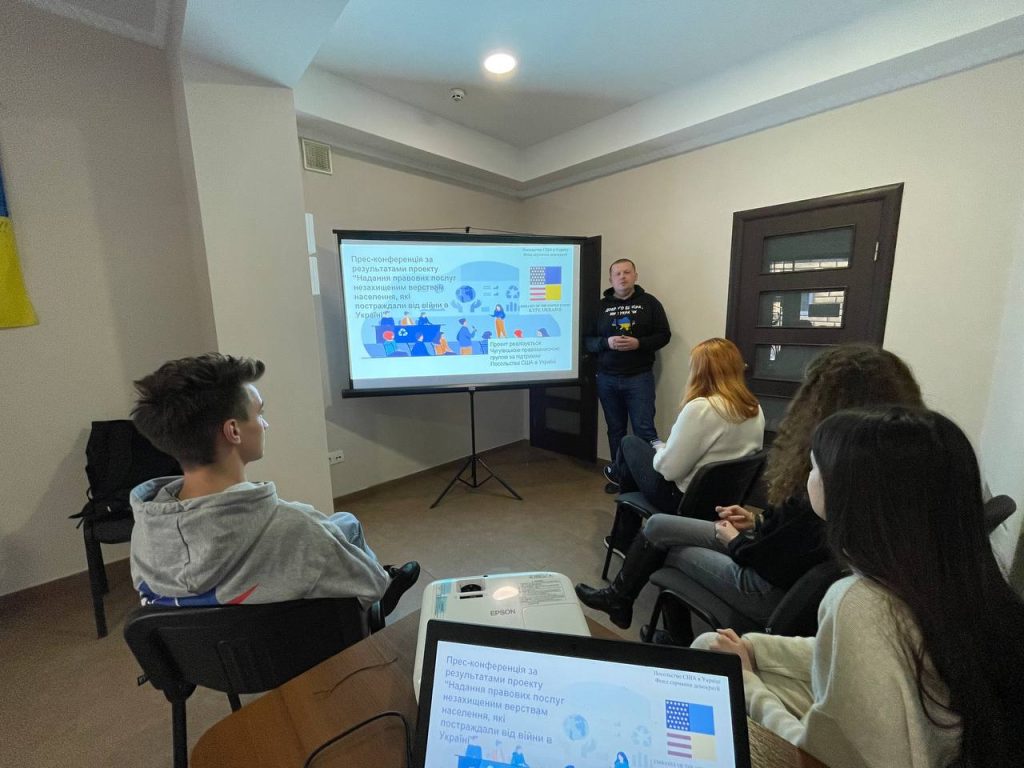
Roman Likhachov during one of the ChPG activities. Photo: Chuhuiv Human Rights Group. Source: Gwara Media
Dobrobat’s mission is to participate in the restoration of housing and infrastructure facilities that are damaged by Russian strikes. Its volunteers are among the first to arrive at the scene of a Russian strike. Along with other volunteer organisations, they help to dismantle rubble, cover roofs, and block windows in destroyed buildings. Its branches operate in various regions of Ukraine.
The withdrawal of USAID funding has also affected Dobrobat, says the head of the Kharkiv branch, Pavlo Filippenko. A recently agreed ‘global grant’, a third of which was from the USAID ‘Heart of Europe’ fund, was supposed to have been used to train 60 veterans in Kharkiv to introduce solar energy and maintain solar panels in local communities.
‘We had only just received the funds, says Filippenko, and literally three days later we received a letter stating that the programme would have to be suspended. We were also required to provide information about what had already been spent. But we had not yet had time to spend anything. The funds in the account are now frozen. We were told that this is pending clarification of the circumstances. However, no one knows when that will occur. We have applied to several other funds, such as Nova Ukraine and the Deutsche Gesellschaft für Internationale Zusammenarbeit, in the hope that they can replace the portion of funding from USAID and thus allow us to carry out this project. There has been no response from them as yet.’
It is one thing when an organisation has not yet started implementing the agreed project, as was the case with Dobrobat. However, it is quite another when work has begun and the funds are already being spent. Many of the programmes being funded from the USA previously received a portion of their funding from USAID. All have now had to suspend their programmes entirely.
‘For example there is a programme for the repair of some dormitories for internally displaced persons,’ says Filippenko. ‘They started spending money, purchasing material, making windows, installing heating, whatever was required. Then the funding was abruptly suspended. The team came, started renovating the buildings and now everything has to be put on hold.’
The same thing happened with equipment for cogeneration plants, supplied to Ukraine in part via USAID. According to Filippenko, it will simply be left unused, because there is no way to connect or properly register the equipment. The programme has been suspended, and those directly implementing it have no right to continue the project.
‘That’s why the situation is both complicated and incomprehensible,’ Pavlo Filippenko. ‘It’s not guaranteed that after 90 days, everything will be restored and the work will continue. But we are not sitting still, we are addressing other funds, writing letters and waiting for positive responses. Thank God, funds have emerged that, understanding the need to continue programmes in Ukraine, are ready to finance the share that USAID was supposed to provide.’
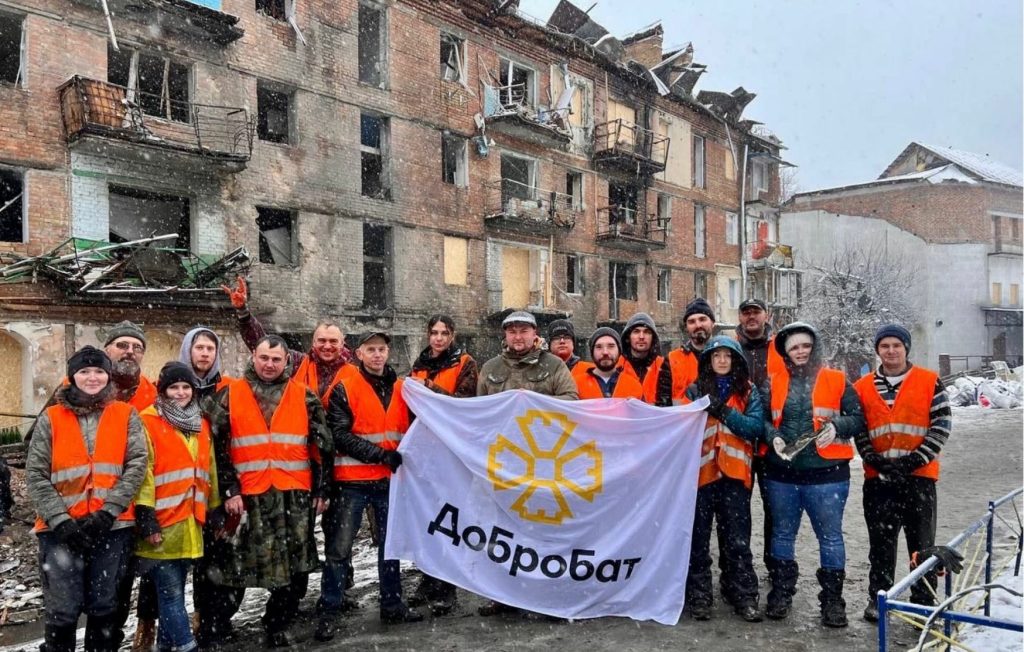
Volunteers of Dobrobat at one of the objects damaged as a result of the military operations of the Russian Federation against Ukraine. Photo: Dobrobat / Source: Gwara Media
The suspension of USAID funding has also affected Buduyemo Ukrainu Razom (We Build Ukraine Together / BUR), a volunteer organisation whose representatives travel to Ukrainian communities, where they help create youth and public spaces and renovate housing for people in need of accommodation. One of BUR’s centre operates in Kharkiv.
However, according to the head of its communications department, Anna Sabo, the organisation has found itself in a difficult situation after losing funding from USAID and NED and could soon lead to the suspension of activities. These were mainly BURchiks or short-term construction operations based on mutual aid and the principle of good neighbourliness. These projects have a short duration of only one to three days. The organisation also has a BUR camp format that lasts from seven to nine days.
‘The camp is our long-term project, when volunteers come to several meeting points and are engaged in restoration or construction work on infrastructure facilities,’ says Sabo. ‘These can be shelters, veteran spaces, or other buildings, depending on what the community needs and what we can provide. The BURchik is a short-term action, with the maximum involvement of local volunteers. This enables us to undertake reconstruction operations in a short timescale. In 2024, we managed to implement 19 BURchiks and had planned to implement 21 in 2025. These plans have now been suspended due to lack of funding.
BUR was also a member of the consortium of the Mriyemo ta Diyemo (We Dream and We Act) program, which was implemented jointly with IREX and supported by USAID. The consortium collaborated for five years within the programme’s framework. More than 27 socially important facilities were restored, including shelters, youth centres, community and veteran spaces. They also managed to implement five reconstruction camps in veteran spaces. USAID funding covered a significant part of institutional costs and a portion of the team’s salaries. In April, BUR was to have organized a training school to enable women to qualify for and work in the construction industry. Six reconstruction camps were also supposed to have been run that would have involved over 300 volunteers.
‘This year, 21 activities were planned with NED in Kharkiv Oblast,’ says Sabo. ‘However, after USAID announced its funding freeze, we received information from our key partner about the suspension of all these activities. This situation is now critical for us. Ultimately, if we do not find funding, then the organisation will lose its established institutional capacity. We will have to stop operating, at least in the short term.’
BUR is therefore searching for alternative means of financing its operations, contacting other European partners and communicating with local and national businesses about various partnership formats. The organisation has launched a raffle, offering one of the organisation’s buses, which it previously used to transport volunteers, as a prize. Sabo notes that BUR is trying to find a way to stabilise the financial situation. It is, of course, particularly important to preserve the team that deals with organisational issues.
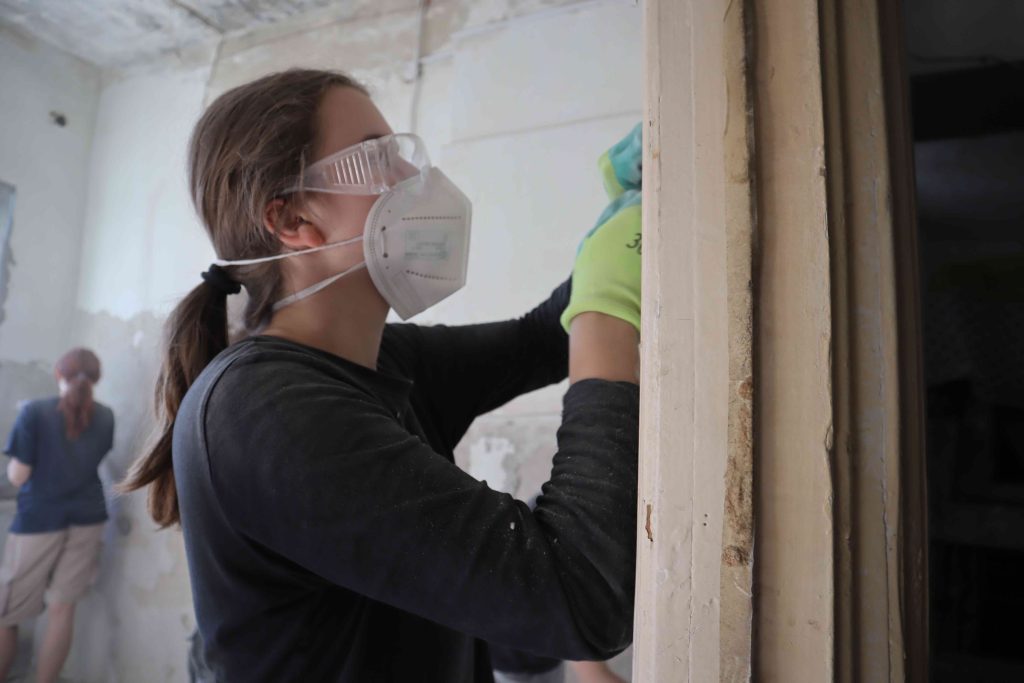
BUR volunteers repairing a hospital. Photo: BUR / Source: Gwara Media
The original Ukrainian version of this article was published in Gwara Media on 28 February 2025
Published 11 April 2025
Original in Ukrainian
Translated by
Stephen Komarnyckyj
First published by Gwara Media (Ukrainian version); Eurozine (English version)
Contributed by Gwara Media © Yuliia Hush / Gwara Media / Eurozine
PDF/PRINTSubscribe to know what’s worth thinking about.

The ‘Trump–Putin deal’ again places Ukrainians in a subaltern role. The leaked contract with its fantasy $500 billion ‘payback’ has been compared to Versailles, but the US betrayal recalls nothing so much as Molotov–Ribbentrop.

Ukraine faces its greatest diplomatic challenge yet, as the Trump administration succumbs to disinformation and blames them for the Russian aggression. How can they navigate the storm?